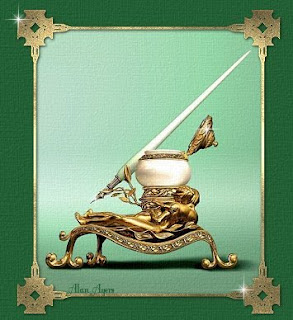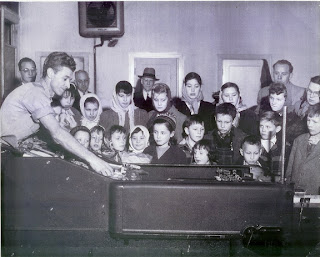(Originally published 8/15/09)

A friend has been posting online about music from our youth: Elvis, Woodstock... and we recently lost some great talents of the music industry,
Les Paul and
Mike Seeger. Well, I got started on YouTube clips, progressing to even earlier musical memories. Which leads me to confessing a guilty secret: my Saturday nights lately are occasionally spent watching old reruns on PBS of, um, well, ah... Lawrence Welk. Now before you chuckle, let me explain!
The first home I remember much about was a big old farmhouse in Winchester, Ky., with very large rooms, high ceilings, wide-plank hardwood floors and no central heating. It was COLD in the wintertime!! Big stone fireplaces downstairs, with metal-grate registers that opened to let the heat get to the bedrooms upstairs. Sorta. I had a big brother and sister, and soon after I turned eight we gained a new little baby brother.
I was known in those years as being very much "Daddy's girl." Tagged around behind him whenever I could. I was kinda frail and thin, a 'sickly child'... allergies and a series of other not-too-serious maladies... so maybe I did get more than a fair share of attention from my daddy. He worked the second shift, 3-11pm, at the newspaper in Lexington. Through the week he would get home around midnight, when good little girls were supposed to be long abed. In the mornings he would sleep in a bit, and I was encouraged to do the same, to keep the noise level down til he was up and about (a habit that persists to this day, whenever possible!). I liked nothing better than to tag along with my daddy, 'helping' him with his chores, which included raising a big garden: strawberries, corn, tomatoes, white half-runner green beans... yum. Daddy always made a big production of bringing me the 'first' ripe strawberry of the season - made me feel so special!
When I got older and started to school, Daddy's work shift meant that the kids didn't see much of him through the week. Weekends were special because Daddy was home all day. He was the designated grocery-shopper for the family, and many Saturday mornings I would go with him to the Kroger's in town. Always returned with my own special bag of candy or some other treat that didn't have to be shared with my siblings. Spoiled? Ha - rotten, yep!

Mom was an excellent seamstress and made me some very pretty dresses, often with an apron-like pinafore or a sash with long strings to be tied in back, and I always insisted that no one but Daddy could tie those big bows just right. I have a very clear memory of him teaching me to tie my own shoelaces as well. And when I was feeling puny, nothing helped more than having Daddy at my bedside, holding my hand and telling me how much he needed his 'helper' back up and about. I still want to be petted and coddled a bit when I'm under the weather, lol.
I remember when our first telephone was installed - a big black clunky thing on a party line. You could pick it up and listen in on the neighbors' conversations! And we had a lovely big wooden cabinet in the living room with brass-handled doors that housed a small black-and-white television -- state-of-the-art for the day, pretty fancy. Saturday morning cartoons were my favorite, but I had to take turns with my sister (eight years older), who for some reason preferred to watch American Bandstand. Weekend nights were a special family time, often spent in front of the TV... usually with me on Daddy's lap. Watching all the showbiz icons from the late 50s and early 60s.
One of Daddy's favorite shows on those weekend evenings was Lawrence Welk. I think the Jackie Gleason show used to follow Welk on Saturday nights, and Red Skelton was in there somewhere. Mom would bring fresh popcorn or other snacks and join us sometimes. My big brother would often be sprawled on the floor in front of us, or maybe sitting at a card table working on his model cars. My sister and I both liked the Lennon Sisters.
There was a man on the Welk show with a very deep voice who would sing "Sixteen Tons" -- the tune that was such a big hit for Tennessee Ernie Ford. Daddy and I would sing along to 'our song' and he taught me to snap my fingers in time with the beat. In my memory, that song was on pretty often, although maybe it was actually just a time or two. We also liked "
Big Bad John," by Jimmy Dean, around that same time. (A younger gal commented to me recently that she didn't know Jimmy Dean ever did anything but sell sausage... wow, I'm showing my age here!) One of the recent reruns featured 'young teenage heartthrob'
Pat Boone singing his new hit, "Moody River" -- white shoes and all.
I also remember Daddy singing "O Little Town of Bethlehem" at Christmastime, teaching me the tune. And on summer afternoons when someone turned up with a guitar, he could sometimes be persuaded to pick out "Wildwood Flower" or "Cripple Creek." He played a pretty decent harmonica, and also had fun with the "
jews harp." I learned to love country and bluegrass music in those early years as well, at my daddy's knee... Flatt & Scruggs, Bill Monroe, Hank Williams, Patsy Cline... especially anything with a fiddle or a banjo! Santa surprised me one year with a "
Magnus Chord Organ" and a small stack of songbooks; my talent was very limited and the thing was more toy than instrument, but Daddy was my most ardent fan -- always requested "
Red River Valley."
In later years, in other houses, weekend nights with Lawrence Welk remained one of my dad's favorites, even as I branched out to, ah, more exciting musical interests. But those special times created a strong bond and warm memories. When I see those early reruns today I am instantly transported back through the years... feeling so safe and happy and cocooned, curled up in my Daddy's lap. Sweet, innocent, fun family times. Blessings on both Mom and Dad for giving all their children such a loving start in the world.
More about
Lawrence Welk here. And
here is a link with some interesting facts about "Sixteen Tons" -- "the most successful single ever recorded."

























